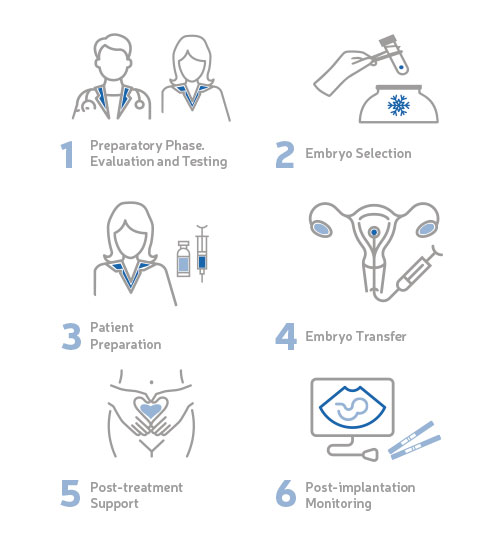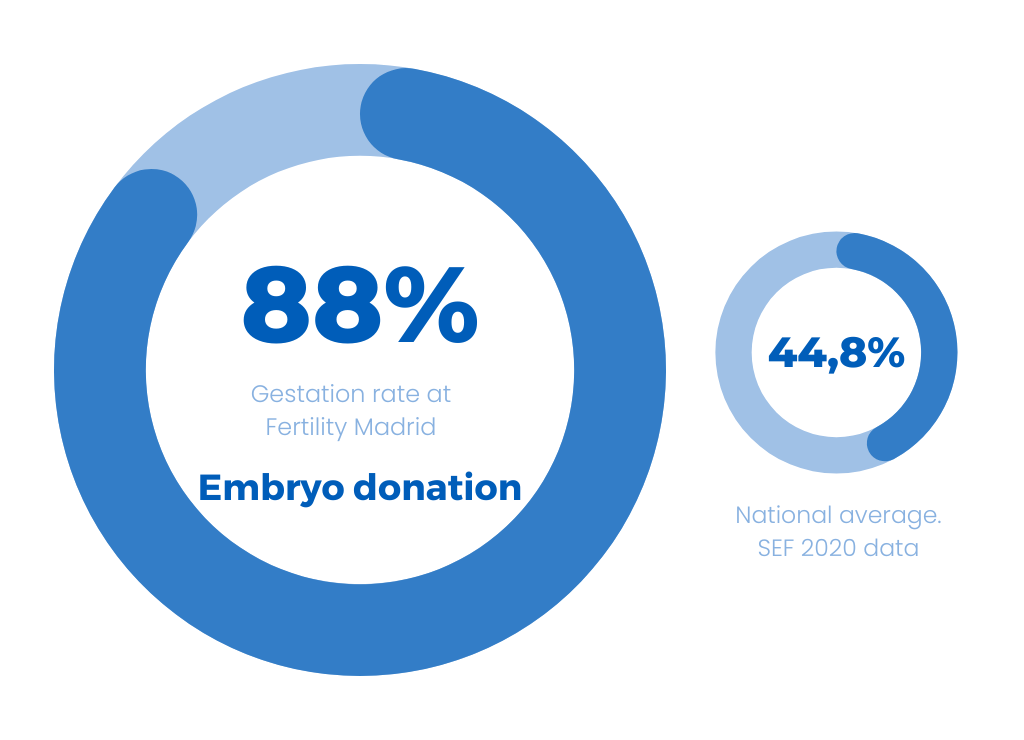In this section, we offer you a comprehensive overview of IVF with donor embryo, an assisted reproduction procedure that can open new opportunities for conception for couples facing difficulties in having children. We will delve into what IVF with donor embryo entails, who the ideal candidates are for this treatment, the detailed step-by-step process, success rates, and what experiences you can expect on your journey to motherhood through this method.
Our purpose is to provide you with clear and accessible information that allows you to make informed decisions about your fertility treatment. We are here to accompany you at every stage of the journey, offering support and guidance. Let’s start this exciting journey together! Together, we create life.
- What is IVF with donor embryo?
- When is IVF with donor embryo indicated?
- IVF with donor embryo process
- IVF with donor embryos success rates
- IVF with donor embryo costs
- IVF with donor embryo in Madrid, Spain
- FAQs
What is IVF with donor embryo?
IVF with donor embryo is a procedure involving the receipt of donated embryos, which come from women or couples who have undergone in vitro fertilization (IVF) treatments and have already had children. These individuals choose to donate their frozen embryos to other couples or women seeking to start a family.
These embryos may result from gamete donation, such as egg and sperm donation. The selection of donated embryos is the sole responsibility of the medical team in charge of the treatment, who strive to find the best immunological and phenotypic compatibility between donors and recipients.
When is IVF with donor embryo indicated?
IVF with donor embryo is mainly intended for the following cases:
- When a woman has a low egg count or eggs of poor quality.
- When a woman suffers from primary ovarian insufficiency or completely lacks ovaries.
- Severe genetic diseases with a high risk of inheritance that cannot be prevented by other means.
- If implantation failures or repeated miscarriages occur.
- When gonadal disorders and other genetic irregularities related to gamete endowment occur.
- When a man has a low sperm count or sperm of poor quality, and the woman meets one of the above conditions.
- When single individuals or same-sex couples wish to have a child using donated embryos.
IVF with donor embryo process
The legislation in our country allows for IVF with donor embryo, all of which is regulated by Law 14/2006, of May 26, on assisted human reproduction techniques.
The embryos come from healthy women aged between 18 and 35 years old and 18 to 40 years old in the case of men.
Embryo donation is done anonymously, and according to the law, a child born through this technique does not have the right to know the identity of the egg or sperm donor, even after turning 18.
We detail how the process of IVF with donor embryo works at Fertility Madrid:
This initial phase involves orientation about the process, counseling, and medical evaluations. Routine gynecological tests, blood, and urine analysis are conducted on the prospective mother.
Donated embryos are carefully selected to ensure their viability and quality. They are chosen based on your phenotype (such as hair color, eyes, skin, height, blood type), the gynecologist will select the suitable embryo so that the future newborn resembles its parents physically.
The patient undergoes endometrial preparation to ready her uterus for embryo transfer. This can be done with hormonal medication or in a natural cycle.
The transfer of previously vitrified embryos is performed using a thin catheter, deposited into the patient’s uterine cavity, thus facilitating the embryo’s development in her own body. This procedure takes place in the operating room, and it’s an outpatient process that usually lasts about 15-20 minutes.
After embryo transfer, you will continue taking progesterone and estradiol until the day of your pregnancy test. This is known as luteal phase support, as the uterine lining is supported with progesterone to aid embryo implantation.
Monitoring/Pregnancy Test 10-12 days after the transfer, the pregnancy test is performed at the clinic.

IVF with donor embryos success rates
Donated embryos typically have a high success rate compared to other assisted reproduction treatments. At Fertility Madrid, the implantation rate in embryo adoption reaches 88%.

IVF with donor embryo costs
IVF with donor embryo adoption offers a series of significant benefits, including:
Reduced Emotional Stress: For many couples, IVF with donor embryo provides a sense of relief and hope after years of struggling with infertility.
Community Contribution: By opting for IVF with donor embryo, couples who donate their surplus embryos have the opportunity to help other couples fulfill their dream of having children.
Option for All: IVF with donor embryo is an inclusive option available to single individuals, heterosexual couples, and same-sex couples who wish to start a family.
At Fertility Madrid, we are here to provide the support and personalized attention you deserve at every step of the journey towards motherhood.
- 1 Blastocyst 2.900€
- 2 Blastocyst 3.900€
- Donor selection interview
- Gynecological examination and ultrasound monitoring
- Hormonal controls
- Endometrial preparation
- Laboratory work and embryo vitrification
- Embryo transfer
- Pregnancy test (B-hCG)
- 2 confirmation ultrasounds
- Fertility Coach accompaniment
IVF with donor embryo in Madrid, Spain
Request your appointment now!
In our fertility clinic, you can undergo your IVF with donor embryo treatment in the center of Madrid. Our IVF clinic is located at C/General Oraá, 47 (Corner of Castelló), 28006; close to parking lots, metro lines, buses, and hotels.
Frequently Asked Questions about IVF with donor embryo
In the matching process for IVF with donor embryo, we will select embryos that best fit you based on your phenotype and other relevant characteristics. This involves seeking donated embryos whose physical and genetic traits are as compatible as possible with yours. Selection will consider aspects such as ethnicity, eye color, hair color, and other physical characteristics. The goal is to find embryos that maximize the likelihood of treatment success and achieve the closest possible resemblance to their future parents.
You can choose between one or two embryos to increase pregnancy rates or if you decide in the future to give a sibling to your child.
Yes, as long as embryos are available from the same donors, you can opt for them to give a sibling with the same genes to your other child.
Like any medical procedure, IVF with donated embryos may carry some associated risks of which you will be informed before starting treatment. Pregnancy-related risks may vary from woman to woman due to her background and underlying conditions. Other risks may include complications with medication for endometrial preparation or failure of pregnancy to occur or reach full term.
Yes, in Spain, embryo donation is completely anonymous.
The information provided about embryo donors in an assisted reproduction clinic is usually limited to medically relevant aspects. This may include details such as age or blood type.




 C/ General Oráa 47, 28006, Madrid
C/ General Oráa 47, 28006, Madrid (+34) 910 052 808
(+34) 910 052 808

 Appointment
Appointment 


